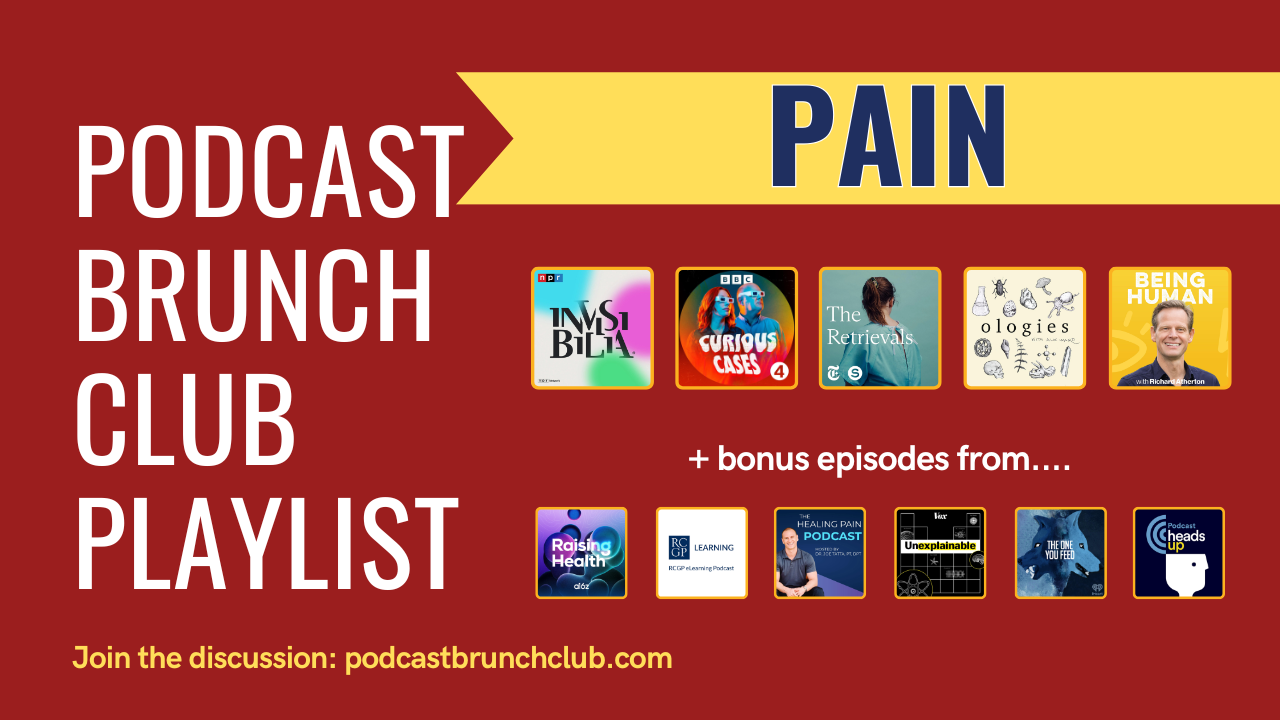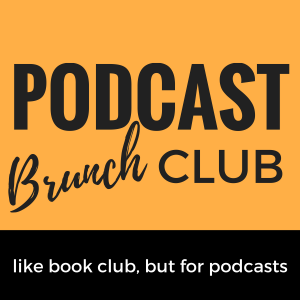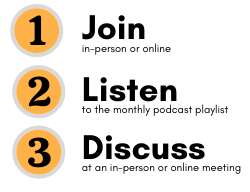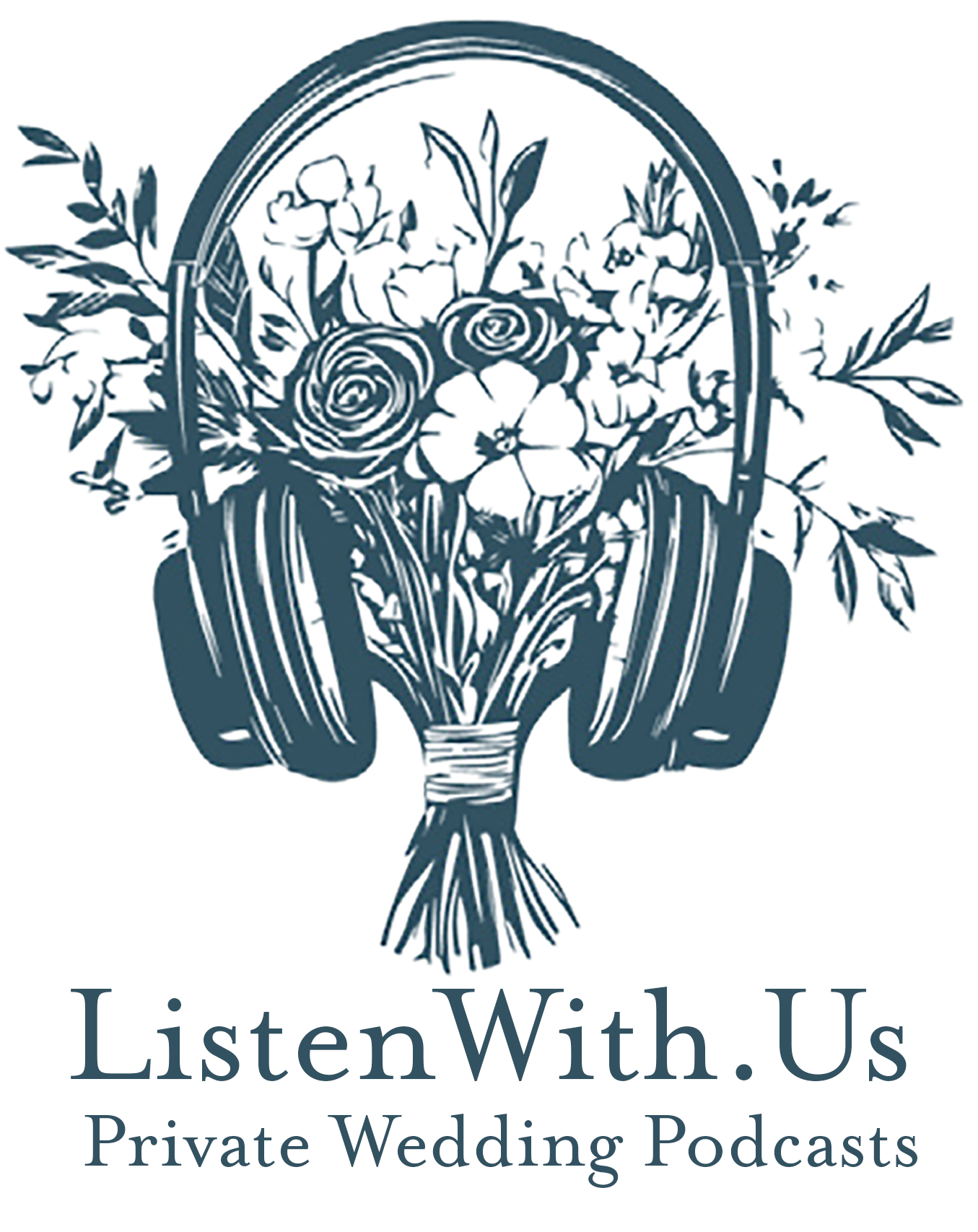PAIN: May 2025 podcast playlist


What is pain, really? Is it just a signal from the body—or something far more complex? In this playlist, we explore pain not just as a physical experience, but as a cultural, psychological, and deeply human phenomenon. From the power of the mind to unlearn chronic pain, to the biases—gendered, racial, and institutional—that shape how pain is perceived and treated, these episodes invite us to reconsider everything we think we know about discomfort and healing.
This playlist was curated by Adela, founder of PBC and leader of the Chicago chapter, with input from Jessica, leader of the East Bay Chapter.
Podcast Playlist on PAIN
Get the full playlist on your podcast player of choice using these platforms:
| This Month’s Podcast Playlist | Running List of PBC Podcast Playlists |
| Listen Notes | Spotify | Listen Notes | Spotify |
Invisibilia: “The Fifth Vital Sign” (March 2019, 59 min)
We look at how our culture’s massive effort to address pain has paradoxically increased it. And we follow one young girl as she struggles through a bizarre and extreme treatment program. NOTE: The treatment in this episode is administered by trained professionals in a hospital setting (and should not be implemented without medical supervision).
Curious Cases: “A World of Pain” (September 2018, 34 min)
Why do people experience pain differently when they go through the same event? Professor of Pain Research, Irene Tracey, welcomes Adam in to the room she calls her ‘Torture Chamber’. Burning, electrocuting, lasering and piercing are all on the menu, but which will hurt the most? Hannah speaks to Steve Pete from Washington who has a rare genetic condition which means he doesn’t feel pain. For chronic sufferers, this sounds like heaven, but a life without pain has brought untold suffering to him and his family, including the tragic story of his brother, Chris. We look at how the body creates pain, why some people feel it more than others, and how this knowledge could help scientists treat pain more effectively in the future.
The Retrievals: “Episode 1: The Patients” (June 2023, 1 hr)
Patients at a fertility clinic experience excruciating, unexpected pain. For months the reason for that pain remains hidden. Then they get a letter from the clinic.
Ologies with Alie Ward: “Dolorology (PAIN) with Rachel Zoffness” (November 2021, 1 hr 34 min)
PAIN. What is it? Where does it come from? And how can we hurt less? Which hurts more, a kidney stone or heartache? Why does chronic pain persist? Can we turn down our pain dials? To answer these huge questions, pain psychologist Dr. Rachel Zoffness enthusiastically explains the brain, pain and how to retrain it. She is an unabashed neuronerd and a ray of hope in a field that is misunderstood, neglected and under-explained. A true life-changer of a person.
Being Human: “#199 Unlearn Your Pain – with Howard Schubiner, MD” (January 2022, 45 min)
This week’s guest is Dr. Howard Schubiner, director of the Mind Body Medicine Center at Providence Hospital in Southfield, Michigan and Clinical Professor at Wayne State University School of Medicine. According to Dr. Schubiner, our chronic pain is often a learned response or association, meaning that we have conditioned ourselves to associate a trigger with a reaction. Dr. Schubiner suggests that we can “re-wire” our neural circuits to undo this conditioning using his Mind-Body approach.
Bonus podcast episodes:
Why do we experience physical pain? Is all pain the same, or are there different types? Do people experience pain differently? Professor of Neurobiology at Harvard Medical School Clifford Woolf, and Bio Eats World host Hanne Winarsky talk about everything we know about the biology of pain.Technology is today enabling a new, deeper, and much more complex understanding of the phenomenon of pain. Which pathways and neurons are activated in the brain and when, and what patterns might represent different kinds of pain? In this episode (first aired on the a16z Podcast in September 2019), Woolf describes the four different phenotypes of pain, the purpose of each, and what changes when we begin to understand them as distinct types. What does it mean for how we can treat pain in the future… and where we can intervene?
In this podcast Dr Emma Nash talks to Dr Pranav Sharma about gender bias in pain. They discuss what gender bias in pain is, and what evidence there is that it exists. Dr Sharma goes on to explain the possible reasons why it came about and what we can do to address it in our own practice.
We’re discussing topics and beliefs associated with racial bias in pain management and physical therapy. It has been reported that medical students and residents hold false beliefs about the biological differences between blacks and whites. It demonstrates that these beliefs predict racial bias in pain perception and the management of effective pain care. My guest is physical therapist . Michael graduated with a Bachelor of Science in Exercise Physiology and a Minor in Strength and Conditioning from the University of Delaware. He went on to earn his Doctorate in Physical Therapy from Misericordia University in 2013. He works in outpatient sports and orthopedics. He holds certifications in Vestibular Rehabilitation, Functional Nutrition for Chronic Pain, and Instrument-Assisted Soft Tissue Mobilization. In this episode, we discuss how pain is treated differently in the African-American community, who are more likely to receive pain medication, blacks or whites, pain myths and false beliefs that are still alive to this day, hurt pain and sustain pain in African-American and other people of color, challenges to accessing physical therapy and other vital health services necessary for the adequate care of pain in minorities and African-Americans. Finally, issues related to minorities and people of color in the profession of physical therapy. Let’s meet Michael Holder and discuss pain and racial bias.
Doctors can save the lives of premature infants, but the process is often painful. Luckily, a solution might be as simple as a parent’s loving touch.
In this episode, Yoni Ashar explains the elements of neuroplastic pain and offers hope for healing chronic pain. In his work with”Pain Reprocessing Therapy” he delves into how this unique approach differs from traditional pain management techniques. Yoni’s research challenges our understanding of pain and opens up new possibilities for healing and well-being.
Delve into the intricate world of migraine science with Dr Katy Munro, Headache Specialist, and her esteemed guest, Dr Phil Holland, Reader in Neuroscience at King’s College London. In this episode ‘Migraine Science: What’s Happening in the Brain? they embark on a fascinating journey through the complexities of migraine brain chemistry and pathways.
Conversation Starter Questions:
- If someone close to you were in pain—physical or emotional—what would change about how you respond after listening to this playlist?
- Do you believe it’s possible to ‘unlearn’ chronic pain, as Dr. Schubiner suggests? What might that process look like in practice?
- The Curious Cases episode explores rare and unusual pain conditions—how do these edge cases help us understand everyday pain more clearly?
- What role do societal and cultural narratives play in how we experience and express pain?
- Pain is both a physical and emotional experience. Should treatment always address both dimensions? Why or why not?





